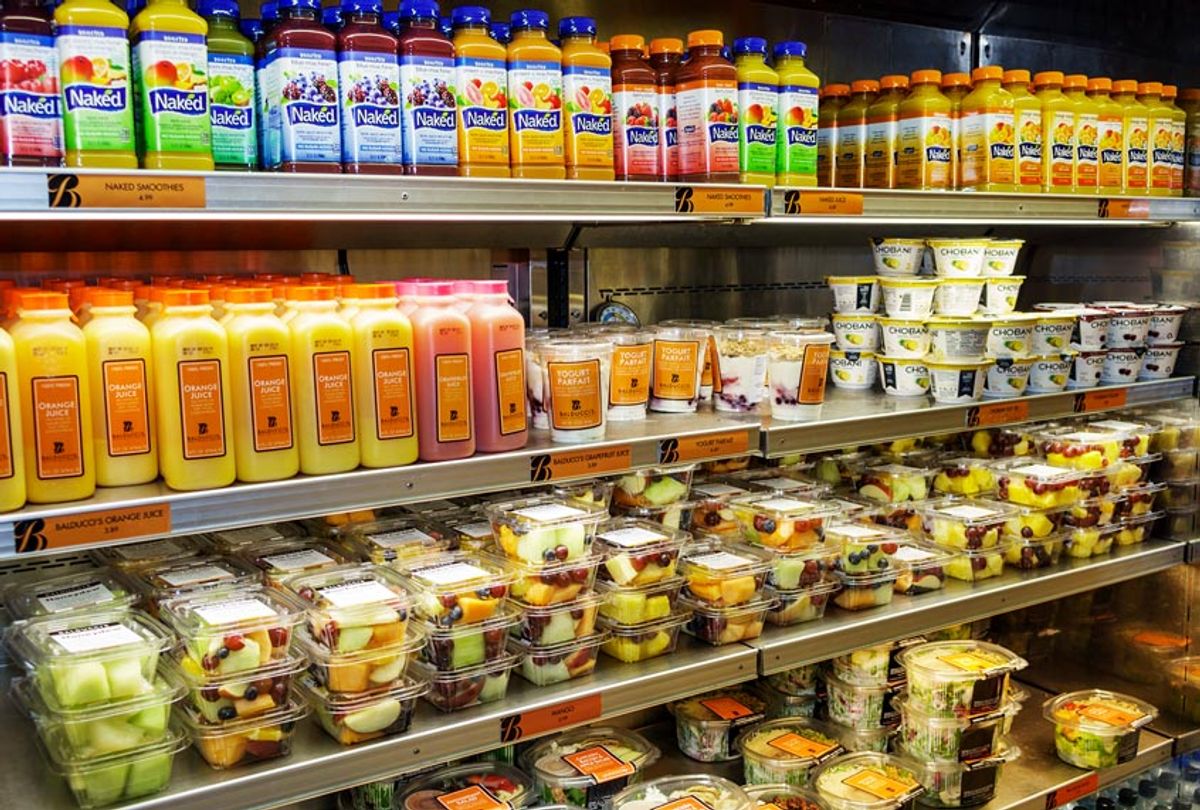A few weeks ago, the staff of Don's Diner and Cocktails in Milwaukee, Wis., erected a wall of wooden shelves in the dining room, filling them with essentials like toilet paper, cleaning products, boxes of dry pasta and tomato sauce. Hanging from one of those shelves is a simple black sign with golden letters spelling out this simple idea: "Look for the Helpers — Mr. Rogers."
Don's Diner co-owner Sean Wille said that since March 18, when Wisconsin governor Tony Evers issued a ban on gatherings of 10 people or more as a way to prevent the spread of the novel coronavirus, he knew they would have to change how they operate.
"It was really a two-thought process when we were making this move: One, how do we keep the doors open? And two, how do we help the community?" Wille said. "We were a restaurant that couldn't accept guests, but there were also people in the community who were looking to get supplies that they didn't have access to at that point: toilet paper, hand soap, dish soap."
Supplies, Wille said, that as a restaurant they could acquire through suppliers.
"So we're putting them out there for people as a corner grocery store," Wille said. "And we're going to be able to keep the shelves stocked a little bit better than the normal grocery."
And that's how Don's Diner and Cocktails became Don's Grocery and Liquor. They offer to-go options like burgers and milkshakes — both boozy and basic — but they also now provide pre-packaged baskets for shoppers, like the Walker's Point basket, named for the diner's neighborhood, that is "ready to go with six rolls of toilet paper, a bottle of hand sanitizer, a roll of paper towels, frozen pizza, Pringles and a bottle of Jack Daniels."
As many restaurants across the country are grappling with state-mandated closures or reduction of services, Don's Diner isn't the only establishment to transition towards selling food on shelves instead of, or in addition to, serving it.
In some cases, this has looked like a simple fire-sale model; restaurants that were closing to the public had a plethora of essentials that, because of an initial wave of panic-buying, were scarce on big-box store shelves: flour, yeast, fresh produce, milk, spices. Customers needed these items, and the restaurant owners needed some cash to bridge the gap and maybe eke out one last payroll cycle for their employees.
But many restaurants, bars and coffee shops across the country are making it a more permanent transition, at least until they can welcome guests again.
Kyle Glanville, the co-owner of Go Get Em Tiger, a small chain of coffee shops in Los Angeles, says they were inspired to add a pantry element to their to-go service after seeing how larger grocery stores were operating during this health crisis.
"They felt unsafe and were always out of the essentials," Glanville said. "At the same time, the specialty food vendors we worked with were tossing product out because restaurants had to shut their doors. It seemed to me that we could offer a safer, more delightful grocery experience leveraging our awesome ingredient vendors and our own commissary."
The Go Get Em Tiger pantry is a mix of ingredients the shops buy and mise en place their employees prepare, like stock and granola. It can all be ordered through their app.
According to Glanville, while they have had to temporarily close four of their Go Get Em Tiger locations, he feels like the five remaining shops-turned-pantries are really making a difference.
"We're filling a real need for folks and it's kept our team working and our community fed," he said. "We're grateful for the way our community is showing up for us and are trying to match that commitment by adding value in this crisis."
But not all the restaurants that have transitioned to selling groceries have brick-and-mortar locations. Last week, the L.A. Bodega on Wheels hit the streets. Powered by a collection of local businesses — 101 Coffee Shop, Coolhaus, Future Gin, MiniBar Hollywood, & VERVET — the Bodega on Wheels project brings an assortment of prepared food, beverages, sweets, produce, and pantry staples to people's doorsteps.
Natasha Case is the CEO and co-founder of Coolhaus, a national artisan ice cream sandwich and frozen dessert brand. The Bodega on Wheels project is using her ice cream trucks as the delivery vehicles.
"It's not just a great way to get people product that is really needed," Case said. "But it's brought our trucks back on the road, which has allowed us to put some great people back to work."
And, Case said, while this period of isolation and quarantine is really challenging for restaurant owners, many of whom are seeing severely diminished profits and fear permanent closure, crisis can breed innovation.
"It really pushes you to truly think really, and come together and execute and execute quickly," she said. "And maybe even after this all settles down, we've created mechanisms like this that can serve people in a more unique way."
If you would like to support local restaurant and service industry members across the country, you can contribute to the James Beard Foundation's Food and Beverage Industry Relief Fund.



Shares